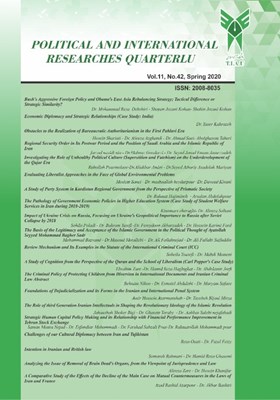Investigating the Role of Unhealthy Political Culture (Superstition and Fatehism) on the Underdevelopment of the Qajar Era
Subject Areas : Political and International Researches QuarterlyRuhollah Pourmolaee 1 , Aliakbar Amini 2 * , Asadolah Athariy 3
1 -
2 -
3 -
Keywords: underdevelopment, Patrimonialism, Keywords:Superstition, Unhealthy Political Culture,
Abstract :
Ruhollah Pourmolaee [1] Amini Aliakbar [2] Asadolah Athariy Mariyan[3] Abstract: Political culture is a set of beliefs, values, and norms about power and politics that are shaped by factors such as geographic and climatic conditions, political and social structures, historical conditions, customs, and the economic system, and then form a process. Constant socialization is institutionalized and passed down from generation to generation. In the Qajar era, political culture in its unhealthy area, such as Patrimonialist culture, believed in superstitious beliefs, fatalism, and prevailing thinking in society, so that its footprint is abundantly found in travelogues, literary works, and intellectuals of this period. The present study, using a descriptive-analytical approach and using the theoretical framework of Norman Fairclough’s critical discourse analysis, seeks to answer the question of what role did unhealthy (superstitious and fatalistic) political culture play in the underdevelopment of the Qajar era? According to studies using library-documentary tools, it was concluded that irrationality, irrationality and ignorance, along with patrimonial culture and authoritarian structure, in this period challenged various economic, political and social challenges. It led to a tendency towards unhealthy political culture such as superstition and destiny, and this led to the reproduction of tyranny, the reproduction of ignorance, the reproduction of ignorance, and ultimately the underdevelopment and backwardness of this period. [1]- PhD Student, Political Science (Iran Issues), Zahedan Branch, Islamic Azad University, Zahedan, Iran [2] - Assistant Professor and Faculty Member, Department of Political Science, Central Tehran Branch, Islamic Azad University, Tehran, Iran:Corresponding Author [3] - Assistant Professor and Faculty Member, Department of Political Science, Takestan Branch, Islamic Azad University, Qazvin, Iran
_||_

